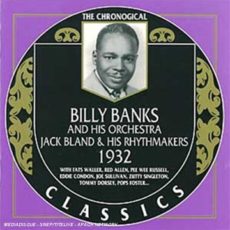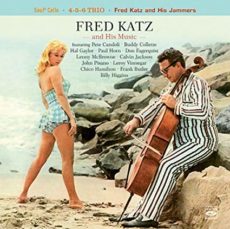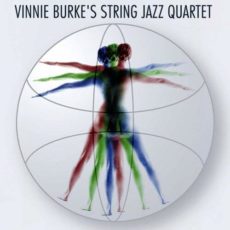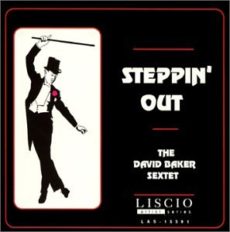
Daily Dose Of Jazz…
Jack Bland was born on May 8, 1899 in Sedalia, Missouri and learned to play the banjo. In 1924 he co-founded the Mound City Blue Blowers with Red McKenzie in St. Louis, Missouri. Their first hit record was Arkansas Blues, a success in Chicago and the American midwest. After Eddie Lang joined the group towards the end of 1924, they toured England.
The late 1920s saw Bland playing more cello and guitar and in 1929, Lang left the group, replaced by Gene Krupa. Also in 1929, the Blue Blowers appeared in a 1929 short film, The Opry House. Muggsy Spanier, Coleman Hawkins, and Eddie Condon would all play in the ensemble in the 1930s, which moved to more of a Dixieland sound.
Bland did session work in New York City with the Billy Banks Orchestra in the 1930s, with Pee Wee Russell, Red Allen, and Zutty Singleton. Following this, he recorded with a group called the Rhythmakers that included Pops Foster and Fats Waller at times.
By the 1940s Jack was playing on 52nd Street at Jimmy Ryan’s Club, playing with Allen and Singleton as well as Edmond Hall, Vic Dickenson, Ike Quebec, and Hot Lips Page. Some of their sessions were recorded by Milt Gabler and released on Commodore Records. From 1942 to 1944 he played with Art Hodes and also with Muggsy Spanier; he led his own band from 1944 to 1950.
In the 1950s, guitarist and banjoist Jack Bland moved to Los Angeles, California, retired from performing, and worked as a taxicab driver until he passed away in August 1968.
More Posts: banjo,cello,guitar,history,instrumental,jazz,music

Daily Dose Of Jazz…
Buell Neidlinger was born in New York City on March 2, 1936 and raised in Westport, Connecticut, where his father ran a cargo shipping business. He played cello in his youth and began studying double bass after a music teacher recommended it to strengthen his hands. He took lessons from jazz bassist Walter Page. In his teens, suffering from a nervous breakdown, which he attributed to the pressure of being perceived as a child prodigy on cello, while institutionalized, he met jazz pianist Joe Sullivan who was in treatment for alcoholism.
Dropping out of Yale University after one year, where he had been studying orchestral music, he moved to New York City and began playing in various jazz settings. He joined Cecil Taylor’s group in 1955 and recorded extensively with Taylor’s groups with Steve Lacy and with Archie Shepp among others until 1961. He played with Herbie Nichols and was also involved with new directions in classical music.
By 1971, Buell moved to California and became the principal bassist for the Los Angeles Chamber Orchestra and was also principal bassist in the Warner Bros. studio orchestra for 30 years. He worked extensively as an orchestral and as a session bassist before becoming a music educator at the New England Conservatory and CalArts. Together with Marty Krystall, he founded K2B2 Records. The sessions he performed on as a strings player included Tony Bennett’s I Left My Heart In San Francisco and the Eagles’ Hotel California.
In 1983, he performed on the Antilles Records release Swingrass ’83. In 1997, and moved to Whidbey Island, Washington State. There, he played in a band called Buellgrass, which included fiddler Richard Greene and featured their version of bluegrass music. Neidlinger’s fourth wife, Margaret Storer, was also a bass player. They played baroque music with friends where he played cello, while she played the violin.
His final recording was The Happenings, accompanied by Howard Alden on guitar and Marty Krystall on bass clarinet and flute, released in December 2017. Bassist and cellist Buell Neidlinger, who worked prominently with iconoclastic pianist Cecil Taylor in the 1950s and ’60s, passed away on March 16, 2018.
More Posts: bandleader,bass,cello,history,instrumental,jazz,music

Daily Dose Of Jazz…
Frederick Katz was born on February 25, 1919 in the Williamsburg section of Brooklyn, New York City and was classically trained. He studied under Pablo Casals and performed with several symphony orchestras. He was a child prodigy on both the cello and piano and performed in public as a teenager and was drawn to the music of Manhattan nightclubs and to folk music. During World War II he conducted concerts and wrote musical revues for the U.S. Seventh Army. He was a member of the National Symphony Orchestra.
Katz was a member of drummer Chico Hamilton’s quintet, one of the most important West Coast jazz groups of the 1950s. His arco cello defined the chamber jazz focus of Chico Hamilton’s Quintet and the group quickly gained popularity. The Chico Hamilton Quintet, including Katz, appeared in the film noir The Sweet Smell of Success in 1957, starring Burt Lancaster and Tony Curtis, where Katz was described in passing as the Quintet’s primary composer. Katz and Hamilton wrote a score for the film which was ultimately rejected in favor of one by Elmer Bernstein.
As a leader Fred recorded several albums, wrote and conducted the arrangements for singer Carmen McRae’s 1958 album Carmen For Cool Ones, and recorded with Dorothy Ashby, Pete Rugolo, Ken Nordine and Paul Horn. He scored nineteen films and television shows including A Bucket of Blood, The Wasp Woman, Creature from the Haunted Sea and The Little Shop of Horrors. Later in his career, Katz became a professor of ethnic music in the Anthropology Department at California State University, Fullerton and California State University, Northridge, where he taught world music, anthropology and religion for over 30 years. One of his students was John Densmore, drummer of The Doors.
Cellist and composer Fred Katz, who was one of the earliest jazz musicians to establish the cello as a viable improvising solo instrument, passed away on September 7, 2013, in Santa Monica, California.

Three Wishes
Calo Scott had one simple answer to the Baroness de Koenigswarter question of three wishes:
- “To realize myself.”
*Excerpt from Three Wishes: An Intimate Look at Jazz Greats – Complied and Photographed by Pannonica de Koenigswarter
More Posts: baroness,cello,history,instrumental,jazz,musician,pannonica,three,wishes

Daily Dose Of Jazz…
David Nathaniel Baker Jr. was born on December 21, 1931 in Indianapolis, Indiana and took up the trombone attending Crispus Attucks High School. He went on to matriculate through Indiana University, earning his Bachelor and Master degrees in Music, having studied with J. J. Johnson, János Starker, and George Russell.
His first teaching position was at Lincoln University in Jefferson, Missouri in 1955, a historic black institution, but Baker had to resign his position under threats of violence after he had eloped to Chicago, Illinois to marry white opera singer Eugenia (“Jeanne”) Marie Jones. Thriving in the Indianapolis jazz scene of the time, he was as a mentor of sorts to Indianapolis-born trumpeter Freddie Hubbard. Forced to abandon the trombone due to a jaw injury that left him unable to play, he subsequently learned to play cello.
The shift to cello largely ended his performing career but began his life as a composer and pedagogue. Among the first and most important people to begin to codify the then largely aural tradition of jazz he wrote several seminal books on jazz, including Jazz Improvisation in 1988. Baker taught in the Jazz Studies Department at Indiana University and made the school a highly regarded destination for students of jazz. His students included Michael Brecker, Randy Brecker, Peter Erskine, Jim Beard, Chris Botti, Jeff Hamilton, and Jamey Aebersold.
Baker’s compositions range from Third Stream to traditional to symphonic works. He composed some 2000 compositions, has been commissioned by over 500 individuals and ensembles, nominated for a Pulitzer and a Grammy award, honored three times by Down Beat magazine, and was the third inductee to their jazz Education Hall of Fame, as well as several other jazz awards.
Trombonist, cellist, composer and pedagogue David Baker, who performed with his second wife Lida, a flautist, since the Nineties and has more than 65 recordings, 70 books, and 400 articles to his credit, passed away on March 26, 2016, at age 84 at his Bloomington, Indiana home.





